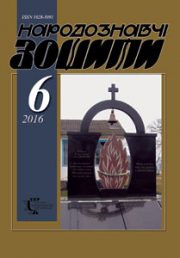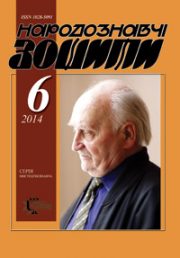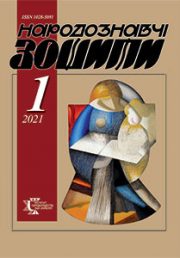The Ethnology Notebooks. 2019, № 5 (149), 1094—1101
UDK 398:7.074(477.86-11)
І. Волошинський:930.25
DOI https://doi.org/10.15407/nz2019.05.1094
CIENTIFIC CONTRIBUTION OF IVAN VOLOSHINSKY TO UKRAINIAN FOLKLORE STUDIES
SOKIL Hanna
ORCID ID: https://orcid.org/0000-0002-8352-2124,
doctor of philological sciences, professor,
Ivan Franko National University of Lviv,
1, Universytetska Street, 79000, Lviv, Ukraine
e-mail: gan.sokil@gmail.com
Abstract. The article explores the folk genres, which Ivan Voloshynsky recorded in the region of Pokuttia. The archival materials are introducted into a scientific range. The purpose of the study is to present and analyze the folklore activities and scientific heritage of the researcher Pokuttya Ivan Voloshynsky. The object of the study is oral poetic materials in the records of folklorists, publications and manuscripts, which are in the archives of the Scientific Society named after Shevchenko in Kyiv. The subject of study is the figure of Ivan Voloshynsky in the context of the historical and folklore process, principles and concepts of his scientific work, genre specificity of folk poetry works, thematic-motivational fund, individual elements of poetics. Geography of the study — settlements of Horodenkivsky district in Stanislavivschyna (now Horodenkivsky district of Ivano-Frankivsk region). Chronological boundaries cover the end of the nineteenth and early twentieth centuries, a time associated with the active ethnographic work of the Ethnographic Commission of the Scientific Society named after Shevchenko in Galicia. The folklorist recorded most of the material in his family village Daleshiv as well as in Kolinky village, Chernylitsy, Ripuzhintsy and partly in other regions (Bukovyna, Podillya).
The genre of diversity is represented by ritual folklore (songs «on Malanka», haivky, wedding songs, funeral rites and etc.), samples of non-ritual lyrics (family songs, kolomyiki), folk prose (fairy tales, legends, demonological narratives). In addition to oral poetical materials, Ivan Voloshynsky was also interested in exhibits from Pokuttya for completion of the Museum of the Scientific Society named after Shevchenko in Lviv, bought them from the inhabitants of the region and sent to the secretary of the Ethnographic Commission, Volodymyr Hnatyuk.
The findings have shown that Pokuttia folklore recorded by I. Voloshynsky enriched the editions of the Shevchenko Sholarly Society with interesting and bright variants of various folk poetic genres. Most of them have nationwide basis preserving some lokal features. Thus, the personality of I. Voloshynsky deserves further studies.
Keywords: region Pocuttia, folklore, genres, themes, images, motives, fixations, archives.
Received 28.09.2019
REFERENCES
Cheremshynsky, O.S. (2005). Voloshynsky Ivan. Encyclopedia of modern Ukraine (Vol. 5, p. 128). Kyiv [in Ukrainian].
Hnatyuk, V. (1912). Need for Ukrainian Demonology (Vol. 2, issue 1). Ethnographic compendium (Vol. 33). Lviv [in Ukrainian].
Hnatyuk, V. (1904). Front word [to]: Need for Galician-Ruthenish demonology (T. 1). Ethnographic compendium (Vol. 15, p. 2). Lviv [in Ukrainian].
Gnatyuk V., Dashkevich, J., & Kupchinsky, O. (Eds.). (1980). Documents and materials. Lviv [in Ukrainian].
Barag, L.G., & Berezovsky I.P., (1979.) Comparative index of plots: East Slavic fairy tale. comp. Leningrad: Nauka [in Russian].
Hnatyuk, V. (1916). Ukrainian folk tales (animal epic) (Vol. 1—2). Ethnographic compendium (Vol. 37—38). Lviv [in Ukrainian].
Voloshynsky, I. (1919). Wedding in Daleshev Gorodensky floor. Materials to Ukrainian Ethnology (Vol. 19—20, pp. 2—34). Lviv [in Ukrainian].
Trynyak, L.V. (2016). Wedding ritual at Pokutya in the Ukrainian ethnographic heritage of the second half of the 19th — beginning of the 20th centuries. Gilea. Scientific Bulletin (Vol. 114, p. 24—28). Kyiv [in Ukrainian].
Voloshinsky, I. (1919). Funeral customs and howls in Horodenschyna. Materials on Ukrainian Ethnology (Vol. 19—20, pp. 194—213). Lviv [in Ukrainian].
Dej, O., Jasenchuk, A., & Ivanyzkyj, A. (1987). Ballads: Love and premarital relationships. Kyiv: Scientifis Opinion [in Ukrainian].
Dej, O., Jasenchuk, A., & Ivanyzkyj, A. (1989). Ballads: Family-to-household relationships. Kyiv: Scientifis Opinion [in Ukrainian].
Ioanidi, A., & Pravdyuk, O. (1974). Recruit and soldier songs. Kyiv: Scientific Opinion [in Ukrainian].
Voloshinsky, I. Singers. Record. in Stanislav, Ternopil: 1893—1909. In The Scientific archival funds of manuscripts and phonograms of M. Rylsky Institute For Art Studies, Folkloristyc and Ethnology National Academy of Sciences of Ukraine (hereinafter — NAFRF IMFE). F. 28—3. Od. zb. 103—108 [in Ukrainian].
Voloshynsky, I. Spivanky, Stanislav, Ternopil: 1893—1909. In The NAFRF IMFE. F. 28—3. Od. zb. 106 [in Ukrainian].
Voloshynsky, I. Fables. Fairy tales. Daleshiv: 1912—1913. In The NAFRF IMFE. F. 28—3. Od. zb. 109—111 [in Ukrainian].
Voloshynsky, I. «One Mercenary Served in the Gazdah»: Fairy Tale: 1913. In The NAFRF IMFE. F. 28—3. Od. zb. 112 [in Ukrainian].
Voloshynsky, I. «There was this news in Oliyivі Korolіvzі»: songs, kolomyks, historical songs, household records in the villages of Stanislavschyna. In The NAFRF IMFE. F. 28—3. Od. zb. 113 [in Ukrainian].
Voloshynsky, I. Legends. Stanislavschyna: 1897—1911. In The NAFRF IMFE. F. 29—3. Od. zb. 206 [in Ukrainian].
Voloshynsky, I. Bajki. Fairy tales, demonology. Collected in Stanislavschyna: 1909—1911. In The NAFRF IMFE. F. 29—3. Od. zb. 207 [in Ukrainian].
Voloshynsky, I. Bajki. Fairy tales household. Collected in Stanislavschyna: 1909—1911. In The NAFRF IMFE. F. 29—3. Od. zb. 208 [in Ukrainian].
Voloshynsky, I. Bajki. Fairy tales household. Collected in Stanislavschyna: 1909—1912. In The NAFRF IMFE. F. 29—3. Od. zb. 209 [in Ukrainian]
Voloshynsky, I. Spivanky. Songs, kolomyky. Collected in Stanislavschyna: 1910. In The NAFRF IMFE. F. 29—3. Od. zb. 210 [in Ukrainian].
Voloshynsky, I. Legends, collections. in the Stanislav region: 1897—1911. In The NAFRF IMFE. F. 29—3. Od. zb. 206. Fol. 30 [in Ukrainian].
Hrushvsky, M. (1994). History of Ukrainian Literature: in 6 volumes, 9 books (Vol. 4, b. 2). Kyiv: Lybid [in Ukrainian].






